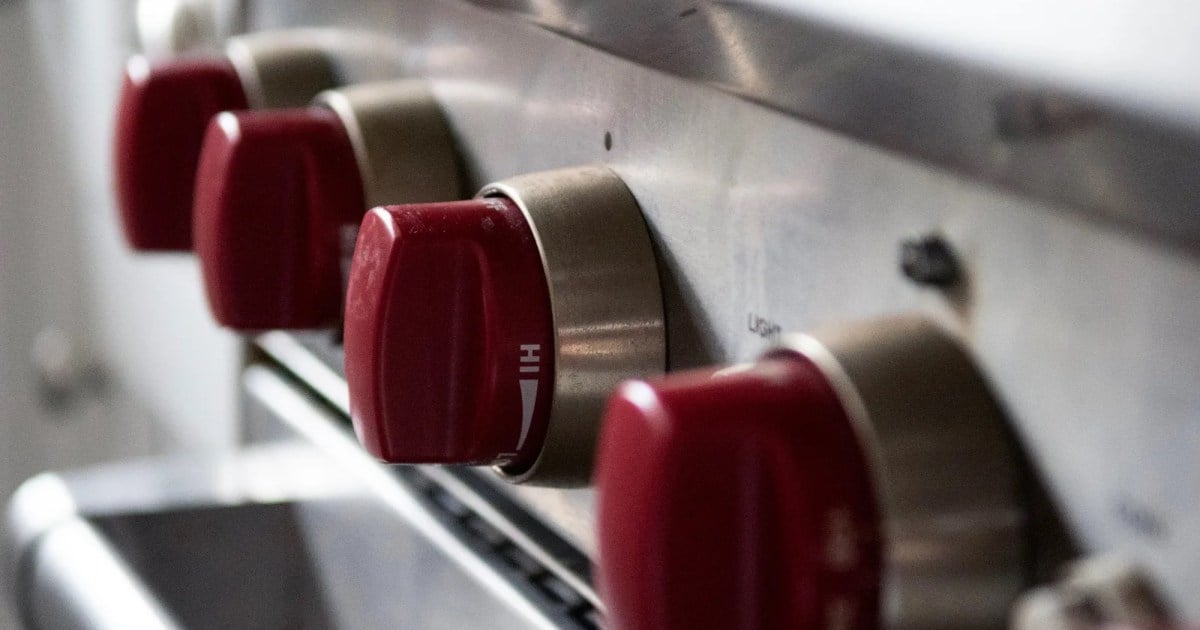omg, is this for real? weird how recent conspiracy rumbling about gvmnt taking away gas stoves may have been covering for a real conspiracy. First I’ve read about benzene in stove fumes. Like cooking w/gas
I had gas stoves most of my life. Several years back I had an apt with a nice flat top electric and I liked it. Fast forward a couple years and my current place has a gas stove again. I hate it now and I miss the electric.
It was reliable. It didn’t smell or leave combustion byproducts in the air. I don’t have to worry about making the house explode if a burner is bumped on.
The thing I notice the most is it’s wasteful. On the electric the handles of my pots were never too hot to touch. Gas stove, so much heat is lost around the pot. The handles are always hot and the above range microwave handle gets hot too. (I am using the appropriate sized burner for the pot size.)
This article was posted on another community yesterday. Most of the comments were about how awesome gas is and how crappy electric is.
In my adult life I’d always had electric stoves, and they were fine. Two years ago I bought a house with a gas stove and I was so excited because I love cooking and it’s supposed to be the best.
I fucking hated it. There’s so many cons to gas stoves that people never talk about and I don’t get it.
The waste heat is insane. Your pan and pot handles get hot. You can’t leave utensils in the pot or pan, they will burn. It directly heats and humidifies the air in your kitchen. It’s finicky on low heat and you can sometimes have a burner go out.
And these are just ways that gas sucks to use. I’m not even talking about health impacts.
We switched to induction and it’s definitely the best. But I’d rather have resistive electric than gas.
One benefit of electric and induction that’s a bit subtler: you can smell what you’re cooking better. With gas, there are all these hot gasses coming up around your pan that make smelling things hard.
And how annoying they are to clean. In China, I had a gas stove and it seemed like it left residue on everything. Getting into the nooks and crannies to scour it was also annoying, and one time I accidentally broke one of the burner heads.
My induction stove at home now is just a flat surface. It cooks quick enough, has no fuss, I don’t have to worry about carcinogenic fumes, and I can just quickly wipe it down when I’m done if any shit gets on it.
I like everything about electric cook tops with the exception of using a wok.
It’s so weird because I’ve hated every electric stove I used and loved every gas one.
One big reason is that when a gas burner is off it is no longer producing any heat. The number of times I’ve had a boil over or burned food because the heat doesn’t just turn off immediately makes me hate electric. And that’s just one reason.
So take it off the burner.
And then it’s getting cold while I wait for the burner to cool down. Oh, and now the burner is a burn hazard, and whatever boiled over is searing itself to the burners.
I disagree. The burner and grate retain a bunch of heat when you turn the gas off. Maybe not as much as the electric element but it’s still a consideration.
Thanks for your response, I appreciate the dialog and wish people didn’t downvote you for having an opinion.
There’s going to be latent heat with any burner, even induction. But resistive electric is the absolute worst.
Resistive electric just requires a different technique. If you adapt to it, they work just fine.
The only time I ever enjoyed cooking with gas was when I was doing it professionally. They always seemed sketchy to me in a home kitchen where you don’t have a ventilation system than can fully cycle the air in less than a minute. My only complaint with my current glass-top electric is it’s only got 1 big burner.
deleted by creator
The amount of black burned on food stains around my burner will never come off fully. Barkeeps friend has finally failed me.
I’ve done both and I prefer cleaning the gas range. Those glass tops are never as easy to clean as they claim, and with sealed burners it’s just a matter of mopping it up with towels.
Electric glass tops can be hard to clean at times. I’d still prefer it over gas in general.
Induction glass tops are sooooooo easy to clean. Nothing gets burned on because the heat is in the pan, not in or under the glass top.
Glass tops definitely easier to clean than non-sealed burners, but I always end up with charred rings over the burners that have been polished into the glass and will never come out.
With sealed gas burners I just pour some boiling water on the cooktop, wait for it to cool, mop it up with a towel, and scrub the nasty stuff off with a scrubber.
Inductions are crazy easy to clean, though.
deleted by creator
I don’t think you know what I’m talking about. With sealed burners there is no way for anything to get under them. They’re totally water tight, and there’s no way to lift them up to get underneath them.
deleted by creator
I have sealed burners in the stove in my house, so I’m sure I know what I’m talking about. The picture at the top of this page is a good example
The burner on the right side is a sealed burner, which is what I’m talking about, and the one on the left is a special kind of unsealed burner, but if you scroll down you’ll see the traditional sort of unsealed burner you’re thinking of.
deleted by creator
Induction stoves are on another level. You could sort of argue about open flame vs glass top electric… Though even then, flame had big downsides.
But induction is just superior. Almost no energy loss. No heating the air from the element. No burns from the element. Almost instant response from temp changes.
I also am back on a propane stove and am working on replacing it.
Induction stoves can heat much faster than the hottest setting on many gas stoves which gives many the impression that electric stoves are “hard to control”. But then the resistive element ones have the opposite problem where the power is somewhat lower than gas. Most people don’t differentiate the type of electric stove they’re using, and just project a single bad experience or two to all electric stoves.
I like the high-speed reactivity of gas (it gets hot enough to cook almost immediately, but I can live with electric and I like the safety of induction (which was nice when young kids were about).
However I grew up in Los Angeles smog which messed up my lungs. So I may be high risk.
I’m too poor to replace stoves or choose homes based on a philosophy, though.
Yeah I’m in an apartment. I get what I get.
This conversation reminds me of my grandfather. I wonder what he would think of this subject and the addition of induction for cooking.
Cooking on wood was his choice no matter the house modern or rustic, he would install a wood cookstove. He grew up logging and working in remote logging camps. There was no gas or electricity to choose from then.
He use to cook up great breakfasts every day. He hated electric stoves as he said they would only heat up the middle of his large frying pans. There was one that exploded on him. The pans were quite large, dwarfing the large element on a electric stove.
Thinking back it would be odd seeing a woodstove next to a unused electric stove. Anyways Swedish Crepes were his thing. The woodstove was a even heat for him he said. The best heat you could ever get in his mind. My grandmother use to also bake in this stove. He was good at controlling the heat for her.
When they retired to his cabin he built, his wood cookstove also had a water jacket for hot water tank. (there was no power grid). That stove was running from 430am to 6or 7pm at night every day. Then there was the regular woodstove to heat the main area of the cabin. It was only in his last years that he had to accept a propane cookstove in the kitchen for his new wife to cook on in the summer as the days were getting pretty hot to run a woodstove. She also wanted hot water at all times so a propane hot water tank came in the deal. He use to cook a little on the propane stove but wood was always his first choice.
When those issues with overheated pots happen on a gas stove, it is because you have turned up the flame too high for the size of the pot.
Using that logic I’d have to keep all my burners on low all the time and spend hours getting water to boil.
The whole concept of industry co-writing laws and regulations has utterly failed. How much precedent do we need?
Lobbyists are not counselors, it’s just legalized corruption. This is not a healthy part of democracy, but eroding trust.
It’s working against the people.
We know this. Reagan knew this when he opened the door for lobbyists.
According to Marx ( Das Kapital ) corruption of the government towards the interest of the owning class is inevitable.
We still don’t know an effective way to keep government public serving. Marx recommends the end of hierarchy, but that model needs some development.
But yes, government is intended to serve the public and when it doesn’t (such as with regulatory capture) that is government failure. US federal and state governments typically fail, only rarely enacting policy consistent with public interest.
I think if you read beyond Marx there are several ideas that are valid alternatives.
Not that I am a well informed political scientist (so speculating robust political systems is well beyond my pay grade), but I am certainly open to ideas.
Here in the States we haven’t been able to engage in some basic improvements, like disposing of the Electoral College, which was a white-power motivated backdoor from the beginning. So finding the path from regulatory-captured late stage capitalism is going to be a challenge.
The problem is that you want people knowledgeable in the subject to have input, and unfortunately knowledgeable people are usually those that work in the industry as they are up to date with the latest tech, challenges, information, etc.
If you didn’t have that input it would just be politicians and lawmakers making the rules all willy nilly with no real understanding of the nitty gritty details.
There does need to be a better way, but I don’t know what it is.
Who watches the watchmen?
sometimes it’s a good influence on some otherwise self absorbed politicians. Most of them are going to vote for whatever gets them reelected. trick is to use the system to benefit everyone. Each pol has a staff of career law-writers who know far more than their boss but make them look good for a paycheck. I worked in a college with lots of premadonna phDs whose ignorance about technical details made it hard to sit through a speech without laughing. Smaller scale politics over projects the rank and file had to implement for a paycheck. Still managed to do useful work now and then.
switched to an induction stove recently because they’re so much easier to clean
We swapped the standard electric for induction and it’s a game changer. Fortunately most of our cookware is enameled cast iron so we didn’t have to buy all new stuff.
Can I get a loan, because you must be THE MONOPOLY GUY
I got an induction hotplate for around $50. Took one of the burners and grate out of my gas stove & put the hotplate there. It’s great for day-to-day, and the other burners are still there if I want to make a production.
I have a cheap induction hot plate and while it boils water extremely fast it still burns things on low heat because it’s just cycling max power on and off at set intervals. I don’t like it for anything that needs long, low, and slow cooking because it will burn it
That’s true with any electric heater element. It’s called pulse width modulation (PWM) and is actually very effective when done properly. Seems like the frequency is too long on yours. It should be cycling many times per second, meaning the full power is only on for milliseconds at a time, nowhere near enough to actually burn things.
Even a cheap Arduino is capable of PWM at 16MHz (16 million duty cycles per second; we’re talking microseconds here now). So I’d think even a cheap one should have good PWM control, but I guess you get what you pay for.
I don’t know about proper induction cooktops, but the hot plates all seem to use mechanical relays to switch power, so they’re limited to far less than 16 MHz. Most seem to use regular, industrial controls that operate at more like 1-0.1 Hz.
I honestly don’t think you’d want to use anything but a mechanical relay to switch 10-15 amps. Do that with a solid state relay, and you’re going to waste 15-25 W in a small package that will have to be radiated somewhere.
I read a bunch of reviews from reputable sites and bought what they said was the best. Apparently they couldn’t even spring for an Arduino because the pulse widths are seconds long.
It’s not the logic that’s expensive, it’s the solid state relay suitable for high power, high frequency switching
By “expensive” we’re still only talking a dollar or two. It’s not going to spike their cost to the point where it would be prohibitive to them.
I don’t need MHz switching. A few kHz would be better than just turning it on for 1 second out of 10 for “low power.”
That’s $50 food money bro, it’s 2023
What are you gonna buy with $50? One banana?
Realistically? A shitton of instant yakisoba and overstuffed ravioli
You’re complaining about food prices and you’re buying premade food? What a joke. Do you know how much rice, beans and greens $50 gets you?
About fifty dollars worth I reckon
The induction is mindboggling. Haven’t gotten the hang of it yet because I JUST CAN’T UNDERSTAND THE HOW.
It’s life changing. I’m coming from the electric “coil” stoves
Granted, it sucks that a few of our old pots are useless now, but we have plenty good still, so not a huge loss
Any time you combust hydrocarbons you create some incidental aromatics like cancer causing benzene. I don’t find the comparison to cigarettes too useful though.
Right. No one has been lying about this.
Everyone should know that being around burning things is bad. It’s not like the actual food you’re cooking is not also putting these things in the air, even on an electric stove…
This is why it’s so important to have (and use) a hood that vents to the outside. These used to be standard features in homes, but it’s increasingly common just to have a recirculating hood with a grease filter. If you’re in one o those kitchens, open a window.
From another news story posted here yesterday or the day before: vent hoods are not strong enough to get all the contaminants.
We don’t expect them to vent all contaminants but to reduce the density so they don’t cause significant harm.
If they don’t do that, its a regulatory failure.
It’s crazy how builders are even allowed to cheap out by building housing with a stove vent hood that only vents indoors. One of the first things I did on my house when I moved in was replace the vent hood with a higher flow one, add a booster fan inline with the duct work, and replace the flex duct with sheet metal ducting. I can’t imagine cooking without it and I don’t even cook with gas.
If that’s the case “you can pry my gas stove from my cold, dead hands” may come sooner than expected.
The whole article is a mishmash of different articles. Some of the articles are citing more articles that are citing studies. Some of the studies they’re citing are kind of bullshit some of their studies they’re citing are reasonable and realistic.
The takeaway from reading the rats nest of science is that natural gas and propane do not burn clean enough to just be openly burned inside without proper venting. And it’s not just the benzene there’s a lot of volatile organics that come off of that. There’s a lot of correlation and conjecture in there. Even the peer-reviewed study they’re talking about is a meta study review, The biases get pretty muddy in that stuff.
Now this also isn’t to say that the gas company are saints and doing the right thing for the consumer. Gas providers are going to lie, cheat, steal, and spend as much money as they reasonably can to protect their business and they honestly don’t give a s*** about the climate or people’s health they’re really just there to make money.
Proper electric stoves are cleaner, faster and more efficient. I don’t them uncomfortable to cook on, but I have to admit it’s probably mainly my unfamiliarity with timing and temperatures associated with electric.
That’s pretty much what a lot of science writers do these days beyond the actual science. Actual science is usually boring and hard to follow unless you are used to it. I only claim to know what I’ve actually witnessed most of the time. There is an art to most complex science. Creative beyond my abilities combined with an intuitive grasp of nature.
article on Mother Jones: https://www.motherjones.com/politics/2023/10/utilities-lying-gas-stoves-health-risks/
We don’t have a stove, but we do have a gas furnace and water heater. When we were buying the home 2 years ago, the inspection turned up a gas leak in the attic and that almost halted the whole thing. That and the radon gear that was installed and never enabled.
We did get it resolved, but man, it was a super scary discovery.
makes you wonder if maybe every single “conspiracy theorist” isn’t just a salesman of some sort
most pols remind me of used car salesmen or baptist preachers. depends what they’re trying to sell some but basically same tactics
The vast majority of the sources of conspiracy theories have a bunch of books to sell.
I turn on the vent hood and enjoy my instant heat.
Convection cooktops heat instantly as well, without needing combustion.
*induction
Convection is a fan that runs in your oven.
Oops, you’re exactly right
I’ve had both, I find gas much more responsive to temperature changing. But you do you.
Sure. I find inductive cooktops are close enough though, and without the dependence on fossil fuel.
Wasted heat is the worst part. The sides and handles of any pan not oversized for the burner gets blazing got and the kitchen spikes in temperature. Gas takes forever to boil water as well.
What do you think powers the house that powers the stove though? Coal is still the first option in many places.
I get my energy from entirely renewable sources. Besides, the electric grid gets cleaner over time.
Really? I have gas and a 50€ IKEA induction plate I use for frying outside and the latter heats oil up surprisingly quickly
deleted by creator
deleted by creator
in my experience induction is much more efficient. I get water at boiling point in 30 seconds or less















